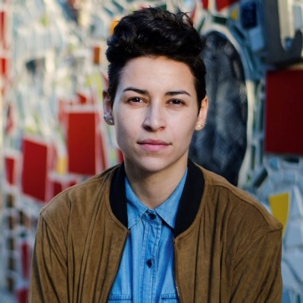|
Born and raised in New York City from Puerto Rican and Jewish parents, Denice Frohman is a poet, writer, educator, and performer who uses her multi-cultural background as a queer woman — she describes this amalgamation as “NuyoJewricanqueer”1 — to explore intersections of race, gender, sexuality, and identity in her writing. After earning her master’s degree in education at Drexel University, Denice worked as a director and organizer at The Philly Youth Poetry Movement, a creative, “literary and youth empowerment”2 non-profit organization she is still involved with today. Over the years, Denice has worked, featured, and performed at many other colleges/universities, schools, youth detention centers, and conferences, spreading her message of claiming the power to be your authentic self and celebrating what makes you unique and worthy.23 Her writing has garnered a large mass of attention across the country, as her poems have collected over 7 million views online. Companies ranging from Twitter to mitú to ESPN to the Huffington Post have commissioned and featured her work. In 2013, Denice won the Women of the World Poetry Slam (WOWPS) Championship as well as the Southern Fried Poetry Slam Championship, the same year she released her debut album Feels Like Home. In 2014, she became a CantoMundo Fellow as well as a recipient of the National Association of Latino Arts & Cultures Fund for the Arts grant. In 2016, she performed at the White House.2 Denice is also a member of the spoken word duo known as Sister Outsider with fellow WOWPS champion Dominique Christina.3 Denice is currently touring. 1 Personal Twitter: www.twitter.com/denicefrohman (@denicefrohman) 2 Personal Site Bio: www.denicefrohman.com/bio 3 Wikipedia Page: en.wikipedia.org/wiki/Denice_Frohman Poem 1: "Accents"“Accents” samples from Denice’s multi-cultural background as she describes the voice and tongue of her Puerto Rican mother, whose “lips can barely stretch themselves around English”. With ample imagery and onomatopoeia referencing Latin American culture, Frohman realistically paints her mother’s unique bilingualism in which she bumps between Spanish and English, the same way someone might dance the “conga” or play the “cuatro”. In this way, her mother’s mouth appears as a musical instrument itself, full of “clave”, “salsa”, and “hand clap”. This piece also opens itself up as a proud expression of those within the Latinx discourse that could connect to the discussion that the piece holds. While an English-speaking person can greatly appreciate this poem, someone with a Latin American culture or background can tap into a deeper meaning held behind the words. It is clear that Frohman intends this, in how she leaves Spanish words untranslated and cultural references unexplained. In her 2013 performance of this poem at the Nuyorican Poets Café, she even invites members of the discourse to playfully answer and repeat after her use of Spanish terms during parts of the piece. Additionally, the description of her mother’s tongue as both “a telegram from her mother” and a “stubborn compass always pointing her towards home” denotes this poem’s conversation as about a shared, generational cultural heritage. Poem 2: "Dear Straight People"In her piece “Dear Straight People”, Frohman humorously flips the benighted narrative so commonly offered to members of the LGBTQIA+ community, framing it in an open letter addressed to “straight people” from Denice and the rest of the community as a whole. In the letter, her line of questioning directed to straight people illustrates the uninformed view of how many perceive members of the gay community. “Why do I make you uncomfortable?” Frohman asks, giving voice to how many people find the gay community rare, unfamiliar, daunting, and non-genuine. In the ‘house’ of a world, “straight people” have managed to isolate queer people, pushing them into “closets” and denying them access to the would-be shared space “living room”.
In a way, Frohman’s poem is also educational in how she clears up misconceptions held by others, speaking on behalf of the queer community with her mixed use of personal and shared pronouns such as “I” and “we” (as well as aligning herself with a “queer young girl” who she briefly addresses in the poem). Furthermore, her use of repetition within the lines of the poem brings attention to her position, enlightens comical fallacies (e.g. “When did you realize you were straight? Who taught you?”), and drives her points home. For example, her thrice-posed question, “Why do I have to prove my love is authentic?” acutely underscores the all-too familiar slant that queer relationships are not real or valid because they do not fall under the societal tradition of heteronormativity. Frohman ends the piece with a vocal declaration of the beauty and tenacity of queer love and expression — in her mind, she chooses to imagine having the freedoms she does not yet have as a queer person (e.g. “kissing [her] girlfriend in public without looking to see who’s around”), in spite of the unacceptance from the sciolistic “straight people”. She refuses to imagine queerness as the problem others try to make it as, and with her, she carries the hopes of all struggling others in that community.
2 Comments
10/23/2019 09:45:06 pm
Spoken word poetry is one of the most popular things right now. I know that there are people who do not think that it is that great, but that is still up for debate. I think that it's hard for some people to understand how great it is, but again, that is just subjective. I want to be able to both write and talk the poetry that I do. I hope that I can be great at spoken poetry too.
Reply
Leave a Reply. |
ENGL4302 Spoken Word Poetry & Pedagogy at LSU ArchivesCategories
All
|

 RSS Feed
RSS Feed